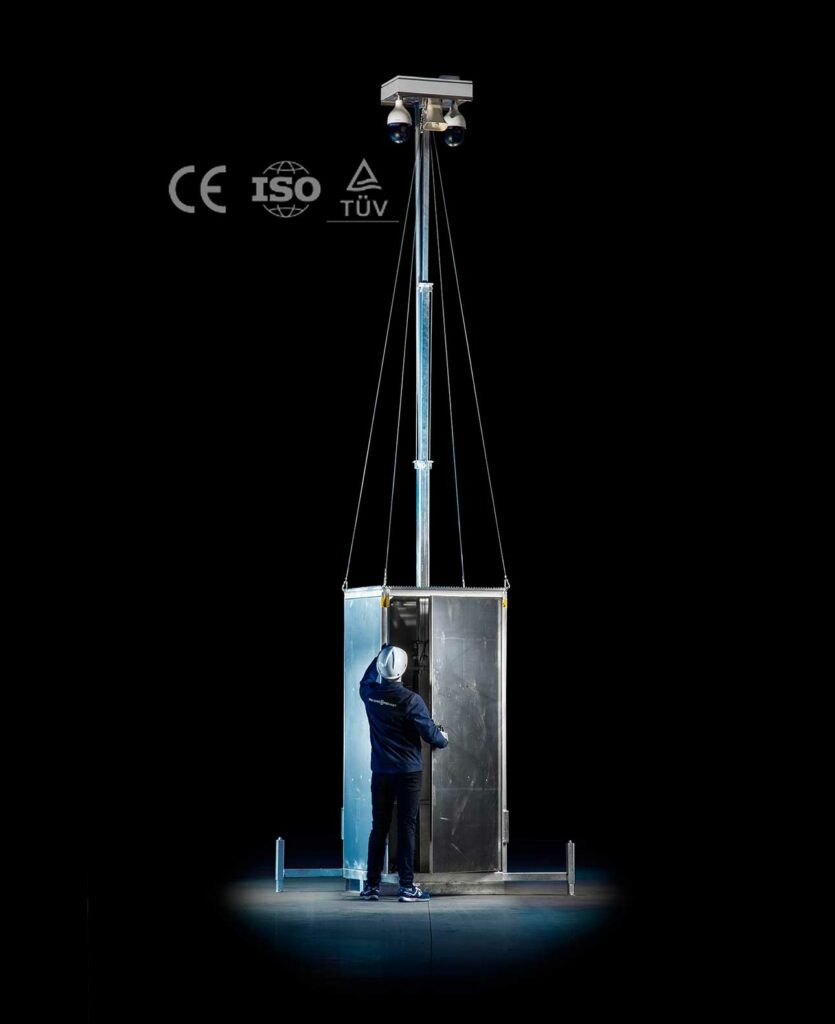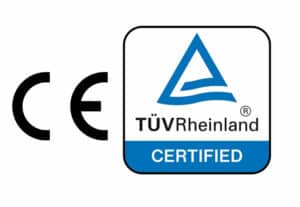Standing out from the crowd is essential in the competitive world of construction. One way to differentiate yourself is by ensuring that your materials meet internationally recognised quality and safety certifications. Two of the most important certifications in this regard are the CE and ISO marks. These certifications not only demonstrate your commitment to delivering high-quality security towers but also open doors to new markets and help you demonstrate compliance on tenders that require safety certifications.
Understanding the CE Mark
The CE mark is a mandatory certification for products that are sold in the European Economic Area (EEA). It indicates that a product has been assessed by the manufacturer and meets all the necessary health, safety, and environmental protection requirements set forth by the European Union (EU). The CE mark is a visible and indelible mark that assures customers that the product they are purchasing complies with EU regulations and meets high standards of quality and safety.
To obtain the CE mark, manufacturers (like TelescopicMast) must ensure that their products conform to all relevant EU-wide requirements. This includes conducting a thorough assessment of the product’s compliance, preparing technical documentation, and signing an EU Declaration of Conformity. In some cases, manufacturers may need to involve a notified body, an independent organisation designated by the EU, to verify their product’s compliance with technical requirements.
The benefits of CE Marked materials in construction
Secondly, CE marked products offer peace of mind to both contractors and end-users. By using certified materials, contractors can be confident that they are working with products that meet the necessary safety requirements. This reduces the risk of accidents, liability issues, and costly rework. For end-users, such as building or site owners, knowing that the materials used in their structures are CE compliant provides assurance that the products and materials on the buildings and sites are of the highest quality.
The significance of ISO Certification
In addition to the CE mark, ISO certification is another important recognition of quality and safety standards. The International Organization for Standardisation (ISO) develops and publishes international standards for various industries. ISO certification signifies that a company follows these standards and has implemented an effective quality management system.
ISO 9001 is one of the most well-known certifications and focuses on quality management. It sets the criteria for a systematic approach to quality control, customer satisfaction, and continuous improvement. By obtaining ISO 9001 certification, construction companies and companies that offer security services, can demonstrate their commitment to delivering high-quality projects and satisfying customer requirements.
The impact of CE and ISO Certifications on construction projects
CE and ISO certifications have a significant impact on construction projects. Firstly, they help to reduce the risk of accidents and injuries on construction sites. By using CE marked materials and following ISO standards, construction companies can ensure that their projects meet the highest safety standards. This leads to a safer working environment for construction workers and reduces the likelihood of accidents that could cause project delays and financial losses.
Secondly, CE and ISO certifications enhance the reputation of construction companies. Clients, whether they are public institutions, public or private developers, value quality and safety in the construction process. By using certified materials and adhering to ISO standards, construction companies can build trust and credibility with their clients. This can lead to repeat business, and an enhanced reputation in the industry.
TÜV Rheinland: a trusted certification body
TÜV Rheinland’s CE certification services cover a wide range of products, including machinery, electrical equipment, and construction materials. By partnering with TÜV Rheinland, construction companies can have their materials independently tested and verified for compliance with EU regulations. This not only enhances the credibility of their products but also allows them to access new markets and customers who prioritise safety and quality.
The role of CE and ISO Certifications in tender processes
Participating in tenders is a common practice in the construction industry. Many public projects require bidders to meet specific criteria, including the use of certified materials. CE and ISO certifications play a vital role in the tender process by demonstrating a bidder’s compliance with safety and quality standards.
When submitting a bid for a project, construction companies that can provide CE and ISO marked materials have a competitive advantage. These certifications act as proof that the company has the necessary systems, processes, and products in place to deliver a successful project. Tender evaluators often prioritise bidders who can demonstrate their commitment to safety, quality, and compliance with industry standards.
Expanding market access with CE and ISO Certifications
CE and ISO certifications not only enhance a construction company’s reputation but also expand its market reach. Many countries outside the EU recognise the value of CE and ISO certifications and accept them as proof of compliance with international standards. This opens up opportunities for construction companies to enter new markets and compete globally.
For example, in countries where ISO certifications are highly regarded, construction companies that hold ISO 9001 certification may have a competitive advantage over their competitors. Clients in these markets value the consistent quality and processes that come with ISO certification and are more likely to choose certified companies for their projects.
TelescopicMast produces ISO and CE certified security masts
TelescopicMast is proud to announce that all of its products carry the globally recognised ISO and CE certifications, reflecting our unwavering commitment to quality and safety. These certifications serve as a testament to our robust manufacturing process, adherence to international standards, and dedication to customer satisfaction. Rest assured that when you choose TelescopicMast, you are choosing a partner that values quality as much as you do.
Conclusion
In the construction industry, ensuring the use of CE and ISO marked materials is crucial for success. These certifications demonstrate a commitment to quality, safety, and compliance with international standards. By using certified materials, construction companies can differentiate themselves, gain a competitive advantage, and access new markets and tenders that prioritise safety and quality. Partnering with reputable certification bodies like TÜV Rheinland further enhances the credibility and trustworthiness of construction companies. In a highly competitive industry, CE and ISO certifications serve as valuable tools for success and growth.
Further reading
- Article. The importance of internationally recognized quality and safety certifications
- Check the products overview that carry CE and ISO certificates
- Request relevant documents from our product development department
- CE Marking Requirements in the United Kingdom: An Overview / John Vinod Khiatani at Compliancegate.com
- CE-Kennzeichnung, der ultimative Leitfaden / Ferry Vermeulen at Instrktiv
- Marquage CE des produits de construction (PDF) / Fédération Nationale des Travaux Publics
- Guía básica sobre el marcado CE de los productos de construcción (PDF) / Ministerio de Industria y Turismo


